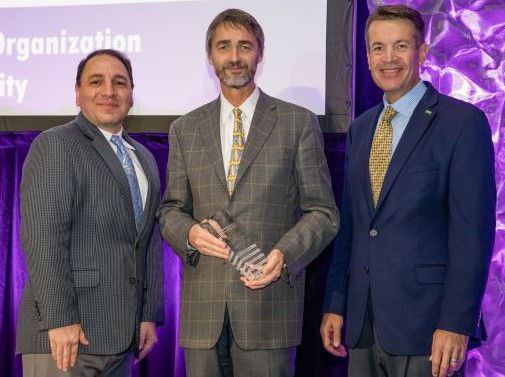Article
Association of Community Cancer Centers Presents David King Community Clinical Scientist Award to Paul D. Hansen, MD, FACS
Author(s):
The ACCC David King Community Clinical Scientist Award was awarded to Paul D. Hansen, MD, FACS, a pioneering leader in research on minimally invasive approaches to major liver and pancreas surgery and the promise these techniques hold for improving the quality of care, the patient experience, and potentially reducing healthcare costs.
From left to right: Ali McBride, PharmD, MS, BCOP (ACCC President), Dr. Paul D. Hansen, Christian Downs, MHA, JD (ACCC Executive Director)

From left to right: Ali McBride, PharmD, MS, BCOP (ACCC President), Dr. Paul D. Hansen, Christian Downs, MHA, JD (ACCC Executive Director)
The ACCC David King Community Clinical Scientist Award was awarded to Paul D. Hansen, MD, FACS, a pioneering leader in research on minimally invasive approaches to major liver and pancreas surgery and the promise these techniques hold for improving the quality of care, the patient experience, and potentially reducing healthcare costs.
Dr. Hansen is a liver and pancreas, hernia, and general surgeon at the Providence St. Joseph Health in Portland, Oregon. The award was presented during the ACCC 36th National Oncology Conference in Orlando, Florida.
The David King Community Clinical Scientist Award recognizes active community clinical research leaders. Award recipients have demonstrated leadership in the development, participation, and evaluation of clinical studies and/or are active in the development of new screening, risk assessment, treatment, or supportive care programs for cancer patients. This prestigious award is named after David K. King, MD, FACP, an ACCC past president, who passed away after a brief battle with cancer. Dr. King spent his entire career caring for individuals with cancer and advocating for access to quality care, while also championing the Community Clinical Oncology Program and the value of clinical research in the community setting.
In his acceptance remarks, Dr. Hansen described the benefits and opportunities he has experienced as a researcher in the community setting. Unlike the “publish or perish” culture of an academic setting, in the community developing a research program requires individual commitment, desire to contribute to the community and improve care, time and energy, and an understanding that the work isn’t driven by desire for a promotion or fame.






